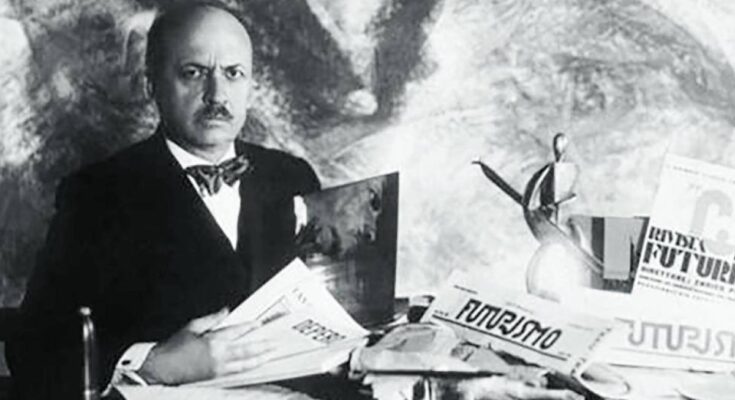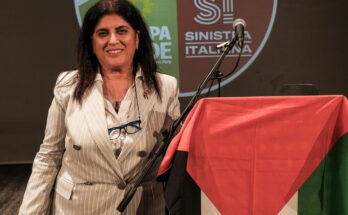by Giordano Bruno Guerri
On 11 May 1944 Benedetta Marinetti went to the Duce: Effetì had no intention of fleeing to Switzerland by crossing the border secretly. He wanted official permission, but Switzerland would not give it. Mussolini knew about Marinetti’s health condition, he himself informed him in a letter dated 18 October 1943, which he wrote to him to justify not being among the combatants. His greatest pain, he explained, was “seeing Italy and Fascism murdered”: a non-random order, to which he added “and also my strong passion for futurist poetry”.
Permission never came and Effetì met Benito on July 25, August 23, and September 21, 1944. What did they say to each other? We can only imagine it, apart from a little testimony from Corriere della Sera director Ermanno Amicucci.
Thirty years had passed since their first meeting, and if Marinetti had fallen, then Duce would have collapsed, especially as July 25 was the anniversary of the fall. The responsibility of history crushes him, he is helpless in the face of events, a shadow of his former self. Italy is divided. its Italy. That ridiculous traitor king defied him after handing Italy over to the Germans. He knew that Hitler thought he was weak, but it was all his fault that if the war was lost, the Führer had to listen to him. Rome. Will he see Rome again? Crowd under his balcony. From the window he saw the lake. He never loved lakes, rivers or seas, they had a betrayal effect on him, and it was here that the most unhappy part of his life occurred, the collapse of everything he had built. Think of the people who follow him, ready to die for him. Meanwhile, the old man before him offered him an impossible rebirth. He heard him repeat that the real and great mistake of fascism was to abandon the republican and socialist principles of the Sansepolcrista era, that the revolutionary faith must be restored in the interests of the people and the national. He answered that the Republic had taken that path, by conducting outreach to the business world. That was not enough for Marinetti, he dreamed of returning to his roots, now everything was coming to an end.
They are two losers. His gaze, once intense and burning, now faded to the two of them. His pacing steps now seemed burdened by an unbearable burden. The civil war marked endless time. The two men, having weathered the storm triumphantly, looked at each other, pretending they still believed in something. The show doesn’t work, they have to convince themselves of the truth of their words: deceiving others is possible, lying to oneself is impossible. Self-love, tiredness, feelings of emptiness, the unacknowledged desire to withdraw will advise you to leave everything behind to enjoy who knows where the last trace of sincere affection remains. But their respective roles, which are very different from each other, require them to remain on stage, under the gaze of the world. The meeting of the two leaders turns into a sad meeting of ghosts.
The ultimate balance of existence is created in their downcast eyes and withering movements. Victor Hugo wrote that “near the grave the mind flourishes”, a sentence Mussolini and Marinetti epitomized with gloom. The red ratio they face forces them to consider the mistakes they have made, the ambiguities they could not avoid, the compromises they could not avoid. This was an exercise which the Duce, from the eve of the Great Council, punctuated with the rhythms of Chinese torture.
The creators of futurism seemed to encourage him by telling him that not all was lost, that revolution still waited. The profession of naive optimism was an extreme concession to his image: a futurist could not indulge in realism, especially if it ended in disaster. But any mention of the future will be a sad thing in the mouths of the survivors. They had revolutionized politics and art with a lightning-fast intuition of vitality, now they found themselves making calculations, measuring a destiny that no longer saw them as creators, they were simply silent spectators. As they observed each other, they reflected themselves, even if Mussolini, filled with emotion and pain, had a swollen face and Marinetti, exhausted by illness and despair, was emaciated and had lost weight.
***
In July 1944 the front line drew closer and Marinetti moved to Salò, a guest in a villa belonging to the lawyer Emilio Piccoli, a stone’s throw from the lake, at 112 street with the romantic name: Cure del Lino. So he was a few kilometers from Mussolini, as the Duce had suggested to him. For two months they met frequently, in conversations whose contents we ignore. On 19 September a group of unknown persons, possibly partisans, attempted to enter the villa. The next morning Effetì and Beny left Salò with an armed guard and moved to Como, closer to Switzerland. With them there was only Luce, the youngest, twelve years old. Ala and Vittoria, sixteen and seventeen, are rescued from a bombing in a small village. The journey to Como took a long time, Anglo-American planes machine-gunned the roads. From there, a few days later, they moved to Cadenabbia, further north. A few weeks passed, they picked up their two oldest daughters and moved to the Bellagio, for better safety. There are five of them in two rooms at the Splendido hotel, overlooking the lake, in a very unfuturistic Art Nouveau style. There they will be able to stay until the long-awaited Swiss permits arrive.
On December 1, 1944, on his last day, Marinetti wrote his last work in Vittoria’s notebook. Junio Valerio Borghese and his X Flottiglia Mas sing: A quarter of an hour of poetry from No glorification of war: “I have nothing to teach you, a world like me in every day of life and a beacon of aeropoetry beyond time and space”. Their courage, often victorious, at the beginning of the conflict has made them a myth, especially among young fascists who do not want to join the regular army led by Rodolfo Graziani, in the Republican Guard police force, in Pavolini’s anti-partisan black brigade. During the Italian Social Republic, X was guilty of crimes against civilians and prisoners, massacres and torture. When the number of volunteers became scarce, he was forced to serve in the military. All this was unknown at the time: Borghese and his men were heroes, for Marinetti they were futurists in the last years of his life, and even today, he is still associated with one of the symbols of post-war neo-fascism.
It was Benedetta who recounted the last hours of her husband’s life: “At 01.20 on December 2, his calm voice called to me: Excuse me. Already awake I want to work too intensely.
I’m a little tired. This crisis is getting worse. Heart stops. And it happened in the night sky moon”. Twenty days later he would be sixty-eight years old.
(Published by arrangement with Agenzia Santachiara © 2025 Giordano Bruno Guerri)



